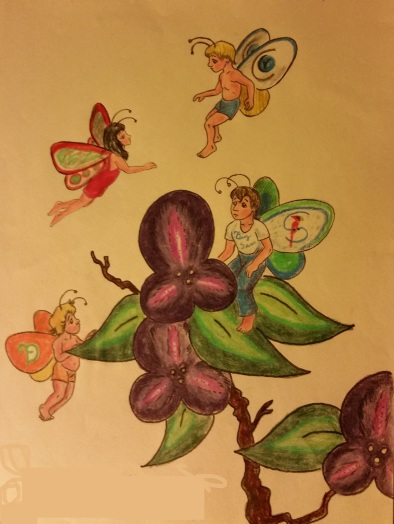I have wanted to be a writer and cartoonist from childhood onward. I didn’t really begin in earnest until the last few years of my teaching career with retirement looming directly ahead. Now I have made the leap off the cliff. I retired a year ago. I did everything short of bankruptcy to put my accounts in order, and transformed myself into a starving artist. I have a full retirement from Texas, subject to a grandfather clause (no relation to the Santa Clause) that allows me to receive enough money to live on for the rest of my life (thanks to the trick of being a teacher back before George W. Bush and Rick Perry came along to pillage Texas education and reduce what they pay those lazy, lousy teachers for their lifetimes of service). Of course, I must try to limit my expenditures as much as possible, because… well, it is a teacher’s pension.
But my plan from the 70’s, begun in high school and carried out through college and my teaching career has allowed me to stay on track to create something massive and complex. My story ideas have been collected over time and are all based on a very simple rule… “Everything is connected.” Every story I now labor to put into prose mentions other stories and has story fishhooks in it to catch readers and pull them into something else. Most of my work is set in farm-town Iowa in the 1970’s, 1980’s, and 1990’s. I made them all a part of the 20th Century on purpose because the personalities the characters are all based on were a part of my life then. Certain elements run through all the stories. Let me explain a few.
1. Some characters appear in many stories (sometimes as a main character, and more often as a supporting character. The French boy who sings karaoke beautifully and makes his cousin’s bar business a success by entertaining people there appears in two stories that happen at about the same time. Both of those stories are still waiting to be written. Tim Kellogg appears in my stories from the time he is but a twinkle in his parents’ eyes until he becomes the leader of the infamous boys’ gang of liars called the Norwall Pirates.
 2. Most of the stories are centered around members of the Norwall Pirates. They are a group of small town boys dedicated to adventure, telling lies, and seeing girls naked. Much of the magic, science fiction, fantasy elements, and just plain hallucinations in my stories are the fault of boys who tell stories and lies so well that sometimes they believe them themselves.
2. Most of the stories are centered around members of the Norwall Pirates. They are a group of small town boys dedicated to adventure, telling lies, and seeing girls naked. Much of the magic, science fiction, fantasy elements, and just plain hallucinations in my stories are the fault of boys who tell stories and lies so well that sometimes they believe them themselves.
3. Character arcs that begin in one book will often continue in another. Sometimes I go back in time and explain something that happened much earlier. The Pirate’s club first appears in my novel Catch a Falling Star set in 1990. The origin of the club is told about in Superchicken, a novel I have blogged about, but not yet published. That story happens in 1974. Valerie Clarke is introduced in the novel PDMI Publishing LLC is currently working on, Snow Babies, which takes place in Winter of 1984. She is the leader of the Pirates in the finished, but not yet submitted novel The Bicycle-Wheel Genius. That story spans 1988 to 1991.
4. Much of my nuttiness was originally created in the 1970’s. Even though the stories were given a setting much later, all the illustrated Paffoonies I have dropped into this post were drawn in 1977 and 1978. I keep these cartoon character model sheets in one of my magical tomes, the Norwall Book, a loose-leaf binder full of drawings and junk carefully preserved in plastic page-protector sheets.
So, this is all the proof that my leap off that cliff into retirement will either make a very big splash or hit the rocks very hard. It will be very something. And I hope to live to see it… especially to get all of the stories I can possibly finish written and published… with a ghost of a hope that my own drawings, cartoons, and illustrations will count for something. So, now my plan is revealed. Let the enemies plan their counter-moves, and may the devil not move the water at the bottom of the cliff.
















 Of course, there is the opposite problem too. Some writers are not hard to understand at all. They only use simple sentences. They only use ideas that lots of other people have used before. You don’t have to think about what they write. You only need to react. They are the reasons that words like “trite”, “hackneyed”, “boring”, and “cliche” exist in English. But simple, boring writing isn’t written by stupid people. Hemingway is like that. Pared down to the basics. No frills. Yet able to yield complex thoughts, insights, and relationships.
Of course, there is the opposite problem too. Some writers are not hard to understand at all. They only use simple sentences. They only use ideas that lots of other people have used before. You don’t have to think about what they write. You only need to react. They are the reasons that words like “trite”, “hackneyed”, “boring”, and “cliche” exist in English. But simple, boring writing isn’t written by stupid people. Hemingway is like that. Pared down to the basics. No frills. Yet able to yield complex thoughts, insights, and relationships.

Reading Other Writers
Nobody who wants to be a writer gets by with just writing and never reading anything by anybody else. It is too easy to devolve into some kind of human mushroom that way, thinking only thoughts a mushroom could think, all fungus-like and having no chlorophyll of their own. You never learn to decode other people and other people’s thinking if you don’t read other people’s thoughts crystallized in writing.
And not every other writer is Robert Frost. Or even Jack Frost who thinks he’s Gene Kelly. There has to be some interpretation, some digging for understanding. What did that writer mean when she said political correctness was like a tongue disease? And what does it mean when a commenting troll calls me a nekkid poofter? Is that how he spells “exceptional genius”? I think it is. Trolls are not smart.
I know people have to make an effort to understand me. When I write, I am writing under the delusion that I can produce literary quality off the top of my head. In fact, I can barely produce hair off the top of my head, and it is gray when I do it. See what I did there? It is the kind of joke a surrealist makes, pretending the idiomatic expression you use is to be taken literally when it doesn’t literally make sense. That kind of nonsense is what my readers have to put up with, and probably also the reason why most of them just look at the pictures. If you have to think too hard when you read, your brain could over-heat and your hair could catch fire. I like that kind of purple paisley prose that folds back in on itself and makes you think in curlicues. But most people don’t. Most people don’t have fire-proof hair like I do.
Sometimes, it doesn’t even take a word to make the point. For instance, why, in the picture, is Fluttershy trying to drink out of the toilet in the dollhouse bathroom? For that matter, why does a doll house even need a bathroom? Applejack doesn’t even fit in that yellow bathtub. I know. I tried to stuff her in there for this picture. And, as you read this, doesn’t this paragraph tell you a lot about me that you probably didn’t even want to know?
When I am reading the writing of others, I am looking for a cornucopia of things. I want to not only understand their ideas, I want to detect the limping footprints across the murder scene of their paragraphs and come to know the deeper things about them as well. I spent years decoding and trying to understand the writing of preliterate kids in my middle school English classes in order to be able to teach them to write better. And I learned that no writer is a bad writer as long as they are using readable words. I also learned that very few writers are James Joyce or Marcel Proust. Thank God for that! And given enough time I can read anything by anybody and learn something from it. I read a lot. And it may not always make me a better writer to read it, but it always has value. It is always worth doing.
1 Comment
Filed under commentary, education, goofy thoughts, humor, irony, photo paffoonies, photos, reading, strange and wonderful ideas about life, surrealism, teaching, wordplay, writing, writing teacher
Tagged as creative-writing, reading for writing, writing, writing advice, writing-community, writing-tips